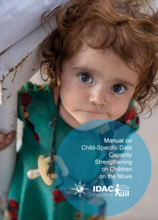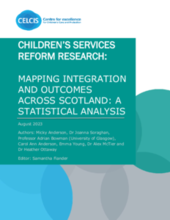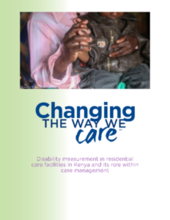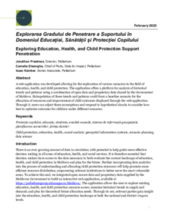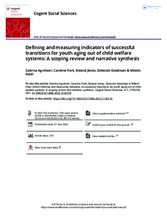Displaying 21 - 30 of 565
This manual aims to help countries and their national statistical systems to improve the collection, analysis, sharing and use of data on children on the move.
Mapping integration and outcomes in Scotland: A statistical analysis investigated if the most recent major structural reform of health and social care services to take place in Scotland has had an impact on outcomes for children, young people and families.
Though research has been conducted on children with disabilities and on children in residential care settings, the intersections of these two topics has yet to be explored in depth. Notably, there is a lack of information surrounding disability measurement within residential care settings, highlighting a gap in the literature. It is estimated that a child with a disability is 17 times more likely to be placed in an institutionalized care setting than a child without a disability, and girls are more likely to be placed in an institution than boys. This report details research conducted in Kenya.
During the 54th session of the UN Statistical Commission, the Global MICS team launched MICS 7 with several new initiatives such as MICS Plus, geocoding, and integration with administrative data sources.
This learning brief was developed as part of the CTWWC 2021 annual report and shares learning from Kenya and Moldova. It is intended to share what the initiative has learned about gathering data and helping governments and their partners to use it for strategizing care reform.
This web application was developed to allow for the exploration of various scenarios in the field of education, health, and child protection. The application offers a platform for the analysis of historical trends and patterns using a combination of open data and proprietary data shared by the Government of Moldova.
This is a recording of a UNICEF webinar presenting the launch of a global database of children in residential care on December 14, 2022.
Related content:
This study represents a scoping review and narrative synthesis that sought to identify indicators used to measure the success of aging out youth in North America and their corresponding methods of assessment.
The Adolescent Data Portal features global, regional and country-level data on key indicators together with information on the socio-economic contexts in which adolescents live are found here. The portal includes globally comparable indicators, closely linked to the Sustainable Development Goals (SDGs).
In 2021 and 2023 Changing the Way We Care (CTWWC) completed a household survey of children and caregivers, in demonstration countries Guatemala, Kenya and Moldova, to understand their experience of CTWWC services, the protective factors in their families, and the status of child well-being. Part of CTWWC’s evaluations, the resulting findings are designed to help CTWWC and other care reform actors to understand the successes and challenges of reintegration from residential care and the provision of family strengthening support.

